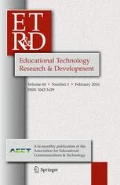Abstract
According to cognitive load theory, instruction needs to be designed in a manner that facilitates the acquisition of knowledge in long-term memory while reducing unnecessary demands on working memory. When technology is used to deliver instruction, the sequence in which students learn to use the technology and learn the relevant subject matter may have cognitive load implications, and should interact with their prior knowledge levels. An experiment, using spreadsheets to assist studient learning of mathematics, indicated that for studients with little knowledge of spreadsheets, sequential instruction on spreadsheets followed by mathematics instruction was superior to a concurrent presentation. The reverse was found for studients with more knowledge of spreadsheets. These results are explained in terms of cognitive load theory.
Similar content being viewed by others
References
Bloom, B. S. (1956)Taxonomy of educational objectives. Handbook 1: Cognitive domain. London: Longman.
Cerpa, N., Chandler, P., & Sweller, J. (1996). Some conditions under which integrated computer-based training software can facilitate learning.Journal of Educational Computing Research, 15, 345–367.
Chandler, P., & Sweller, J. (1996). Cognitive load while learning to use a computer program.Applied Cognitive Psychology, 10, 151–170.
Chi, M., Glaser, R., & Rees, E. (1982). Expertise in problem solving. In R. Sternberg (Ed.),Advances in the psychology of human intelligence (pp. 7–75). Hillsdale, NJ: Erlbaum.
Cooper, G., & Sweller, J. (1987). Effects of schema acquisition and rule automation on mathematical problem-solving transfer.Journal of Educational Psychology, 79, 347–362.
Ericsson, K. A., & Kintsch, W. (1995). Long-term working memory.Psychological Review, 102, 211–245.
Kalyuga, S., Ayres, P., Chandler, P., & Sweller, J. (2003). Expertise reversal effect.Educational Psychologist, 38, 23–31.
Kalyuga, S., Chandler, P., & Sweller, J. (2001). Learner experience and efficiency of instructional guidance.Educational Psychology, 21, 5–23.
Kester, L., Kirschner, P. A., & van Merriënboer, J. J. G. (2004). Timing of information presentation in learning statistics.Instructional Science, 32, 233–252.
Kester, L., Kirschner, P. A., & van Merriënboer, J. J. G. (in press). The management of cognitive load during complex cognitive skill acquisition by means of computer simulated problem solving.British Journal of Educational Psychology.
Kester, L., Kirschner, P. A., van Merriënboer, J. J. G., & Baumer, A. (2001). Just-in-time information presentation and the acquisition of complex cognitive skills.Computers in Human Behavior, 17, 373–391.
Kotovsky, K., Hayes, J. R., & Simon, H. A. (1985). Why are some problems hard? Evidence from Tower of Hanoi.Cognitive Psychology, 17, 248–294.
Larkin, J., McDermott, J., Simon, D., & Simon, H. (1980). Expert and novice performance in solving physics problems.Science, 208, 1335–1342.
Mayer, R. E. (2001)Multimedia learning. New York: Cambridge University Press.
Mayer, R. E., & Anderson, R. (1991). Animations need narrations: An experimental test of a dual-coding hypothesis.Journal of Educational Psychology, 83, 484–490.
Mayer, R. E., & Anderson, R. (1992). The instructive animation: Helping students build connections between words and pictures in multimedia learning.Journal of Educational Psychology, 84, 444–452.
Miller, G. (1956). The magical number seven, plus or minus two: Some limits on our capacity for processing information.Psychological Review, 63, 81–97.
Moreno, R., & Valdez, A. (2005). Cognitive load and learning effects of having students organize pictures and words in multimedia environments: The role of studient interactivity and feedback. [This special issue].Educational Technology Research and Development, 53(3), 35–45.
Paas, F., Renkl, A., & Sweller, J. (2003). Cognitive load theory and instructional design: Recent developments.Educational Psychologist, 38, 1–4.
Paas, F., Tuovinen, J., Tabbers, H., & van Gerven, P. (2003). Cognitive load measurement as a means to advance cognitive load theory.Educational Psychologist, 38, 63–71.
Paas, F., & van Merriënboer, J. J. G. (1993). The efficiency of instructional conditions: An approach to combine mental effort and performance measures.Human Factors, 35, 737–743.
Paas, F. & van Merriënboer, J. J. G. (1994). Variability of worked examples and transfer of geometric problem solving skills: A cognitive load approach.Journal of Educational Psychology, 86, 122–133.
Pollock, E., Chandler, P., & Sweller, J. (2002). Assimilating complex information.Learning and Instruction, 12, 61–86.
Renkl, A., & Atkinson, R. (2003). Structuring the transition from example study to problem solving in cognitive skill acquisition: A cognitive load perspective.Educational Psychologist, 38, 15–22.
Schnotz, W., & Rasch, T. (2005). Enabling, facilitating, and inhibiting effects of animations in multimedia learning: Why reduction of cognitive load can have negative results on learning. [This special issue].Educational Technology Research and Development, 53(3), 47–58.
Sweller, J. (1988). Cognitive load during problem solving: Effects on learning.Cognitive Science, 12, 257–285.
Sweller, J. (1999).Instructional design in technical areas. Melbourne, Australia: ACER Press.
Sweller, J. (2003). Evolution of human cognitive architecture. In B. Ross (Ed.),The psychology of learning and motivation. San Diego, CA: Academic Press.
Sweller, J., & Cooper, G. A. (1985). The use of worked examples as a substitute for problem solving in learning algebra.Cognition and Instruction, 2, 59–89.
Sweller, J., van Merriënboer, J. J. G., & Paas, F. (1998). Cognitive architecture and instructional design.Educational Psychology Review, 10, 251–296.
Tarmizi, R., & Sweller, J. (1988). Guidance during mathematical problem solving.Journal of Educational Psychology, 80, 424–436.
van Merriënboer, J. J. G., & Ayres, P. (2005). Research on cognitive load theory and its design implications for e-learning. [This special issue].Educational Technology Research and Development, 53(3), 5–13.
van Merriënboer, J. J. G., Kirschner, P., & Kester, L. (2003). Taking the load off a learner's mind: Instructional design for complex learning.Educational Psychologist, 38, 5–13.
Wallen, E., Plass, J. L., & Brünken, R. (2005). The function of annotations in the comprehension of scientific texts: Cognitive load effects and the impact of verbal ability. [This special issue].Educational Technology Research and Development, 53(3), 59–71.
Author information
Authors and Affiliations
Corresponding author
Rights and permissions
About this article
Cite this article
Clarke, T., Ayres, P. & Sweller, J. The impact of sequencing and prior knowledge on learning mathematics through spreadsheet applications. ETR&D 53, 15–24 (2005). https://doi.org/10.1007/BF02504794
Issue Date:
DOI: https://doi.org/10.1007/BF02504794




